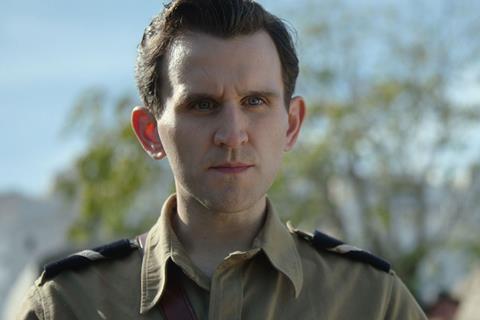Michael Winterbottom carefully recreates Tel Aviv in the 1930s, where much of the tensions that affect Israel today are starting to bubble over

Dir: Michael Winterbottom. Italy/UK. 2023. 119 mins.
The lurch towards political polarisation and extremism in Tel Aviv in the 1930s is explored through the story of a couple who find themselves on opposite sides of an increasingly charged divide in Michael Winterbottom’s ambitious, factually inspired thriller. Shoshana Borochov (Irina Starshenbaum) is a Jewish journalist who, like her Zionist father before her, leans to the left politically. Thomas Wilkin (Douglas Booth) is a British-born assistant superintendent in the Palestinian police force who considers the region to be his home. At times, the film can get a little bogged down in the intricacies of various Zionist factions. However, a more fundamental issue is the fact that Starshenbaum and Booth don’t quite gel as an on-screen couple.
The real villain of the piece is the crude and overbearing forces of British colonialism
This is an ambitious work from Winterbottom; one which juggles taut action sequences with an in-depth examination of the sociopolitical backdrop of the period. Shoshana is a long-gestating project but one which, despite a period setting nearly ninety years in the past, seems uncomfortably relevant to today’s divisive and hardline political extremes. It sees the UK director return to the Toronto International Film Festival, home for a long list of his films including Jude, Wonderland, In This World, Tristram Shandy: A Cock And Bull Story, Genova, The Trip, The Wedding Guest, and Greed. Like much of Winterbottom’s impassioned, socially conscious oeuvre, the film should be well-received on the festival circuit, and might find minor theatrical success with the backing of a committed arthouse distributor.
But mostly, the film will be of interest to anyone fascinated by the backdrop to the current climate in Palestine today. It is a fictionalised version of the real-life relationship between Shoshana and Thomas, as Tel Aviv’s spiralling violence and the heavy-handed meddling of the occupying British drives a wedge between the couple. But the contextual details have been meticulously researched – and are explained at length in a bookending narration delivered by Shoshana. It’s a little unwieldy, certainly. But it’s hard to know how else the film could have imparted the crucial information that explains the circumstances of Soshana and Thomas’s relationship.
Once the factual exposition is out of the way, the film gets down to the serious business of recreating the world. The film was shot in Apulia, Italy, doubling for Tel Aviv in the 1930s – then a new and modern town. The cosmopolitan atmosphere is captured by a soundtrack that is crowded with jaunty jazz numbers. Giles Nuttgens’ limber camera captures not only the authentic look of the period, but also the tacit sense of building threat.
Adding to the general element of unease is the always impressive Harry Melling, who, in the role of Thomas’ boss in the police force, advocates a scorched earth approach to dealing with cultural and religious tensions, and delivers his trademark unblinking zealot’s glare. Ultimately, this is where the film succeeds most effectively. While the romantic element of the story doesn’t always entirely persuade, there’s no question about the fact that the real villain of the piece is the crude and overbearing forces of British colonialism.
Production companies: Revolution Films, Bartleby Films
International sales: Vision Distribution, info@visiondistribution.it
Producers: Melissa Parmenter, Josh Hyams, Luigi Napoleone
Screenplay: Michael Winterbottom, Laurence Coriat, Paul Viragh
Cinematography: Giles Nuttgens
Editing: Marc Richardson
Production design: Sergio Tribastone
Music: David Holmes
Main cast: Harry Melling, Irina Starshenbaum, Douglas Booth, Aury Alby, Ian Hart






![The Brightest SunScreen[Courtesy HKIFF]](https://d1nslcd7m2225b.cloudfront.net/Pictures/274x183/3/5/0/1448350_thebrightestsunscreencourtesyhkiff_312678.jpg)













![The Brightest SunScreen[Courtesy HKIFF]](https://d1nslcd7m2225b.cloudfront.net/Pictures/100x67/3/5/0/1448350_thebrightestsunscreencourtesyhkiff_312678.jpg)



